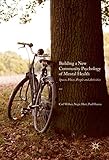Building a New Community Psychology of Mental Health [electronic resource] : Spaces, Places, People and Activities / by Carl Walker, Angie Hart, Paul Hanna.
Material type: TextPublisher: London : Palgrave Macmillan UK : Imprint: Palgrave Macmillan, 2017Description: X, 199 p. 7 illus. in color. online resourceContent type: text Media type: computer Carrier type: online resourceISBN: 9781137360991Subject(s): Psychology | Psychotherapy | Social work | Social service | Clinical psychology | Psychology, Pathological | Critical psychology | Psychology | Psychopathology | Clinical Psychology | Critical Psychology | Social Work and Community Development | Psychotherapy | Social WorkAdditional physical formats: Printed edition:: No titleDDC classification: 616.89 LOC classification: RC434.2-RC574Online resources: e-book Full-text access
TextPublisher: London : Palgrave Macmillan UK : Imprint: Palgrave Macmillan, 2017Description: X, 199 p. 7 illus. in color. online resourceContent type: text Media type: computer Carrier type: online resourceISBN: 9781137360991Subject(s): Psychology | Psychotherapy | Social work | Social service | Clinical psychology | Psychology, Pathological | Critical psychology | Psychology | Psychopathology | Clinical Psychology | Critical Psychology | Social Work and Community Development | Psychotherapy | Social WorkAdditional physical formats: Printed edition:: No titleDDC classification: 616.89 LOC classification: RC434.2-RC574Online resources: e-book Full-text access | Item type | Current library | Collection | Call number | Copy number | Status | Notes | Date due | Barcode |
|---|---|---|---|---|---|---|---|---|
| E-Books | MEF eKitap Kütüphanesi | Springer Nature | RC434.2 -RC574 (Browse shelf (Opens below)) | Available | NATURE | 1419512-1001 |
Chapter 1. The Flawed Assumptions of Psychology and Psychiatry: A Martian Analysis -- Chapter 2. Social Approaches to Distress: From Enclosures to Fluid Spaces -- Chapter 3. 'Bike Minded' - Normal Human Encounters (on Bikes) -- Chapter 5. 'Helping Them Hold Up Their World': Parents of Children with Complex Needs and the Beneficent Organisation -- Chapter 6. I'm Singing in the Rain -- Chapter 7: 'A Place to Be': A Cut and Shut of the Brighton Unemployed Families Centre Project -- Chapter 8. The Joy of Sex -- Chapter 9. Some Possible Directions for the Future. .
This book provides a much-needed account of informal community-based approaches to working with mental distress. It starts from the premise that contemporary mainstream psychiatry and psychology struggle to capture how distress results from complex embodied arrays of social experiences that are embedded within specific historical, cultural, political and economic settings. The authors challenge mainstream understandings of mental health that position a naive public in need of mental health literacy. Instead it is clear that a considerable amount of invaluable mental distress work is undertaken in spaces in our communities that are not understood as mental health treatments. This book represents one of the first attempts to position these kinds of spaces at the center of how we understand and address problems of mental distress and suffering. The chapters draw on case studies from the UK and abroad to point toward an exciting new paradigm based on informal community and socially oriented approaches to mental health. Written in an unusually accessible and engaging style, this book will appeal to social science students, academics, practitioners and policy makers interested in community and social approaches to mental health.
5
